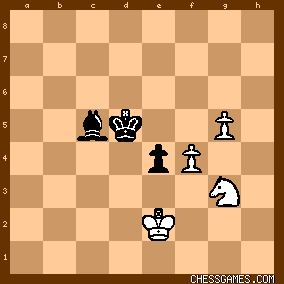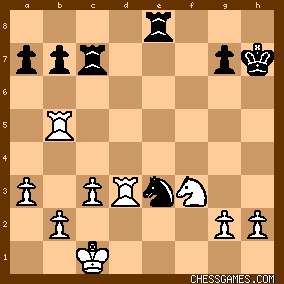|
Introduction
This was a match between Joseph Blackburne (aged 39) and Isidor Gunsberg (aged 26). It took place in London, England, from 17th Match to 11th April 1881. Blackburne gave odds of two games.
"Very shortly after he (Gunsberg - e.d.) resumed public play he challenged so redoubtable an opponent as Blackburne to a match, and a contest was arranged in which the Englishman conceded the odds of two games, and won by a single game." (1) Blackburne
"Mr Blackburne ... has held the position for a long time of the foremost English player, owing to his success in various British and international tournaments. He won the first prize in the Grand Tournament of 1876, and was third in Paris (1878) he also tied for first prize with Herren Berthold Englisch and Adolf Schwarz at Wiesbaden last year." (2) 1881 was a year of mixed fortune for Blackburne, in July he would lose heavily to Johannes Zukertort in a match Blackburne - Zukertort (1881), but then in September, he was a clear first in the very strong 2nd DSB Congress, Berlin (1881). Gunsberg
Gunsberg had emigrated to the United Kingdom in 1876. He had spent most of his time since as the surreptitious human operator of the Mephisto (Automaton). "Mr Gunzberg's bold offer to play any English chess master for a stake of £20 has not yet been accepted. There can be no doubt, however, that the challenge is put forth in perfect seriousness. There is no bounce about Mr Gunzberg. His manner is always quiet and unassuming. It is only when he sits down to the chessboard that the lightning play of his genius arrests attention". (3) Gunsberg continued to gain strength throughout the 1880s. He would get his revenge for this defeat in Blackburne - Gunsberg (1887) and at the very end of the decade was the world champion challenger in Steinitz - Gunsberg World Championship Match (1890) The background to the match "Mr Blackburne sometime ago accepted Mr Gunsberg's challenge published in the Chess Player's Chronicle. From a letter which appears in the last issue of that magazine, it seems that Mr Gunsberg's challenge has been misunderstood. He offers to play Mr Backburne a match of six games, getting two games start, and draws counting one-half to each. Mr Blackburn writes that he cannot accept this challenge, but will play a match of seven games, giving him two games start, but draws not to count. The stake proposed is £10 (4). We hope the match will go on, as there is a considerable lack of chess chivalry just now. Since the above paragraph was written we have seen a letter from Mr Gunsburg published in the Chronicle, in which he accepts Mr Blackburne's proposal; but stipulates that the winner should get only £7 10s of the stake, and the loser £2 10s. Our readers will not be surprised to learn that the Editor of the Chronicle puts his foot on this novel and ingenious method of converting a £10 into a £5 stake. We think Mr Gunsberg will ultimately agree to go the whole animal, and we are sure the Chess world will be a gainer by the match." (5) "After various preliminaries ... the terms of play between these experts were finally agreed upon as follows: the match to commence on Thursday, March 17th, at Purssell's Chess Room, Cornhill, and to be continued on succeeding Saturdays, Mondays, Tuesdays and Thursdays, at the Divan and Purssell's alternatively. The first winner of seven games to carry off the stakes, £10 a side, Mr Blackburne yielding the odds of two games. Draws not to count - time limit 20 moves per hour. Mr Lovelock, President of the City of London Club, is the holder of the stakes and Herr Johannes Zukertort is the umpire." (6) Progress of the match Blackburne was never behind in this match and Gunsberg remained between one and three points adrift of his opponent. Gunsberg had White in the odd-numbered games.
Round 1 2 3 4 5 6 7 8 9 10 11 12 13 14 Total
Blackburne 1 1 0 ½ 1 0 1 1 0 1 ½ 0 ½ 1 8½
Gunsberg 0 0 1 ½ 0 1 0 0 1 0 ½ 1 ½ 0 5½
<Progressive scores>Round 1 2 3 4 5 6 7 8 9 10 11 12 13 14
Blackburne 1 2 2 2½ 3½ 3½ 4½ 5½ 5½ 6½ 7 7 7½ 8½
Gunsberg 0 0 1 1½ 1½ 2½ 2½ 2½ 3½ 3½ 4 5 5½ 5½
Game 1
Both players showed their determination to press for an advantage in this game, Gunsberg with White facing Blackburne's Sicilian. Gunsberg overpressed, miscalculated and lost the exchange. Despite, Gunsberg's best efforts to fight back and complicate the position, Blackburne forced his <e> Pawn through. Game 2
Another hard-fought game in which Blackburne again won the exchange, but this time Gunsberg had a pawn as compensation. Blackburne penetrated Gunsberg's kingside and won back the Pawn. Gunsberg tried to force his queenside pawns through in the endgame, but Blackburn's kingside Pawns were the fleeter. Game 3
Having lost the first two games, Gunsberg had to make the White pieces count. Blackburne repeated his Sicilian defence. Gunsberg managed to double his Rooks on the <h> file threatening Blackburne's King. Despite this, Blackburne tactically outplayed Gunsberg before making an error that cost him a Rook 
click for larger view with <29...Rf5?> 30. Rh8+ Kg7 31. R(3)h7 Game 4
This was the first draw of the match, although Gunsberg was lucky to draw. Blackburne emerged out of the opening with a great advantage. Gunsberg then plunged into complications by sacrificing his Bishop for the <g> and <h> pawns in front of Blackburne's King. In the complex tactics, both players missed winning continuations. In the subsequent double minor piece ending, Blackburne had passed and connected <b> and <c> Pawns.
In

click for larger viewHe could not find a path to victory and the game was drawn on the 57th move. Game 5
Once again Blackburne was successful on the black side of the Sicilian Defence. 
click for larger viewHe took the <e5> Pawn seeing a tactical coup Gunsberg had been oblivious to; if White recaptured with his Rook, he would lose the piece or be mated on the first rank after <Qd6!!>. Game 6
Blackburne sacrificed the exchange on <f6> to weaken Gunsberg's kingside defences. He also had two potentially powerful Bishops. Gunsberg counter sacrificed a Pawn and managed to activate his rooks which methodically picked off Blackburn's queenside Pawns. The match score was now 3 to 2 in Blackburne's favour. The games so far had been tactical scraps which had swung violently one way and then the other. Game 7
Gunsberg lost this game as White by making an elementary blunder when scarcely out of the opening. He suicidally "won" a Pawn 
click for larger viewwith <16. Bxc6?> bxc6 17. Nxd4? and after 17...Rd8 his Knight was pinned fatally against his Queen. Game 8
This game was the second defeat in a row for Gunsberg, who again snatched a hot Pawn in the opening and paid the price. 
click for larger viewWith <10...Qxb2?> Gunsberg's queen became trapped. Although Gunsberg obtained two Rooks in exchange, Blackburn established a passed Pawn on <b7> easily supported by the <a> Pawn. Gunsberg was left with no way to prevent Blackburne queening one of the passed Pawns at a ruinous cost of material to Gunsberg. Game 9
This was the longest game of the match. Blackburne changed defences to the French Defence. He outplayed Gunsberg, but in a minor piece ending Blackburne made a succession of small errors which whittled away his advantage. He then blundered into a loss with 
click for larger view66...Bd6? allowing <67. g6> winning the <e> pawn and the game. The score was now 5½ to 3½ in Blackburne's favour. Game 10
After the longest game of the match came this which was the shortest. Gunsberg's lack of familiarity with the tactical intricacies of Blackburne's openings continued to cost him valuable points. Game 11
Gunsberg missed an opportunity.

click for larger viewWith <29. Rh5+> Kg8 (or 29... Kg6 30. Re5 Rxe5 31. Nxe5+ Kf5 32. Rxe3) 30. Ne5 Nc4 31. Nxc4 Rxc4 32. Rd7 he would have won instead of drawn the game. Game 12
Blackburne's King was unexpectedly and neatly trapped after <28. Kh2?>. 
click for larger viewGunsberg thereafter very deftly manoeuvred his Queen to win. Game 13
Gunsberg introduced a new opening into the match with <1. c4>. Blackburne had the better position when a draw was agreed but the this was a very different type of game without the tactical melees and rapid changes of fortunes seen in many of the earlier games of the match. Game 14
This was the fourth French defence of the match., Gunsberg having used the defence and won when he was Black previously in Game 12. 
click for larger viewBlackburne's well-placed Rook on Gunsberg's seventh rank put pressure on his opponent. Gunsberg tried to whip up complications on the King-side initiative but shed two Pawns. When his initiative petered out, he was left with a hopeless endgame. Contemporary reaction "The match terminated on Monday, April 11th, in the defeat of Mr Gunzberg, Mr Blackburne having scored 7 games to 6 (including the two given), three being drawn. The loser has increased his already high reputation by the gallant stand he has made against his accomplished antagonist. According to "Land and Water" the games will be published in pamphlet form with notes by Mr William Norwood Potter at the price of one shilling." "The British Chess Magazine", May 1881, p.184. Notes
(1). "Bradford Observer Budget", 28th July 1888 (2). Bury and Norwich Post, Tuesday 12th July 1881, p. 3 (3). "The British Chess Magazine", February 1881, p.41. (4). £10 is approximately £1,224/$1,663 in 2021 value, see https://www.nationalarchives.gov.uk... and https://www.measuringworth.com/data... or about 11.5 weeks worth at average earnings in 1881. (5). "Irvine Herald", Saturday 12th March 1881, p.8. (6). "The British Chess Magazine", April 1881, p.116. User: MissScarlett - original collection and the sourcing of ten games for the database. User: Chessical - text.
| 


